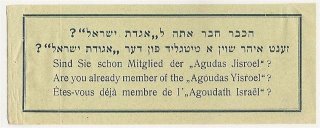Thursday, June 29, 2006
Gimmel Tammuz 5766 Links
* What Chabad.org has to offer
* iPod downloads
* Gimmel Tammuz through the ages
(Yehoshua stops the Sun (1237 BCE), Fire in Lubavitch (1851), Rebbe Rayatz release (1927), The Rebbe's Yahrzeit (1994).
* Berl Yeimi: Gimmel Tammuz, Can there be a Deir Shmeini?
Neo-Tzig & the Sar Hachaleimeis
I was at a large dinner-like gathering, and the Rebbe was sitting at the middle of the head table (the Rebbe looked like he did in the photographs from back in the early 50’s). The room was very plain, something like a recently painted and clean school auditorium.Ok, that’s the dream. Being that a dream is personal I wasn’t planning on sharing it – but is there a down side to posting it? I decided that there isn’t.
There were many objectionable things going on at this function and I was contemplating my departure. One specific objectionable occurrence took place, and I looked to the Rebbe to see his reaction. The Rebbe’s face took on a pained expression, and he remained silent.
At this, I got up and walked out – but then I changed my mind and reentered the room. I walked directly over to the Rebbe and I leaned over and asked (paraphrasing from my memory of the dream here):
“How can the Rebbe allow this to go on, and remain silent?!”
The Rebbe looked at me and answered:
“Two things must be done:
1. The people in charge of this function must be spoken with – they must be reminded that there is a scheduled program and it is their responsibility to see to it that the program is adhered to. At this point they must regain control and return to the planned events.
2. There should be a Sefer Teireh here. Whenever a Melech BeYisroel would go anywhere he had a Sefer Teirah with him – this reminds people that their connection is to Teirah, and it will keep them from deviating from the derech hayoshor.”
(Someone else met the Rebbe in a dream: http://hamikdash.blogspot.com/2006/06/my-dream-last-night.html - Thanks to A Simple Jew for the link)
Wednesday, June 28, 2006
Matzeivoh found

That of Reb Avrohom, the son of Reb Yisroel Noach of Nyezhin, son of the Tzemach Tzedek. He was also the father-in-law of the Frierdige Rebbe. After 6 years of searching in the Beis-Eylem in Kishinev.
COL has more
I say: ''Why not Rabbonim and Roshei Yeshiva?''

Neo Tzig, I fail to see why you single out Shluchim for retirement.
Shluchim are no different than Rabbonim who must find a speech to say on the same 53 Parshiyos every single week for 50 years. They're no different than a Rosh Yeshivah or Mashgiach who has the same few Mesechtos to compose Shiurim on or needs to give Shmuessen the same times of the year every year for 50 years.
We can even go as far as ''forgetting'' the fact that they're sent for life and only the Rebbe can change that, we can forget that there is no retirement age in Shlichus. The mere fact that people get burned out never deterred any Rosh Yeshivah from carrying on in Yeshivah even at a very advanced age, so why should Shluchim be different?
If abuse of power is an issue there are or should be other means to deal with it, retirement doesn't seem to cut it.
Tuesday, June 27, 2006
It works for President, why not Shluchim?
Shlichus. I understand that it’s the Rebbe’s baby and it has changed the world. I get it. However, the current state of affairs (in the Neo-Tzig’s opinion) leaves much to be desired. So, my proposal:
TERM LIMITS.
Anyone “out there” can tell you about “Old-Sheliach syndrome.” It’s only normal that people get burned out, sit back on their laurels, allow corruption to sneak in, etc. here are some advantages that could be had, if we would term limit them:
1. We would have an influx of new blood and energy
2. Success will have to be current, instead of the successful 1976 season.
3. Mosdos wouldn’t become stale – people could have a (very healthy) “what have you done for me lately” approach.
4. Old (and successful) shluchim should then come back to Crown Heights and be living examples for unzer yugent. (Something is terribly lacking & needed – what other kind of community sends their best away to leave only the worst as examples for the future?)
5. We would strike a bit of a blow against nepotism – theoretically eliminating shluchim who really shouldn’t be.
I could surely come up with more advantages, but that’s a good start. I could also come up with a list of cons, but I’ll leave that for you commenters (and I still think the pros will outweigh them). Term limits don’t have to be short (say 25 years?), let me hear what you think...
(Also true: Berl Yeimi: Shlichus should be a no self aggrandizing zone)
Soon, soon my friends
Sunday, June 25, 2006
What's up with Jews and historical accuracy?
About a week ago, we discussed the historical account of Purim (See the ספרים חיצונים thread below).
The conversation touched upon the conflict between the Jewish account (Chazal) and the "historical record." Purim is only one of many examples, but for those who were interested, I am linking an interesting article on the Purim matter here by Brad Aaronson, based on the work of Dr. Chaim S. Heifetz's (Link provided, as promised, by Mekushor (of Berl-Yeimi fame)).
Assuming that we accept the essay as a plausible explanation, we still have a different Purim story than that of the Persians. As I have understood it (from various sources), their version is primarily a struggle between Zoroastrianism and Mithraism. Achashveirosh & Haman (who’s father Hamadasa was the Mithraist high-priest) represent the pagan Mithraism, as opposed to the somewhat monotheistic Zoroastrianism that the previous regimes subscribed to (perhaps Vashti did as well). Jews were considered political enemies and bunched in with the Zoroastrians – especially Daniel, who was a member of preceding Zoroastrian courts. This was also the physical cause for his demotion and ultimate demise (of course, Chazal provide a spiritual reason for this).
Achashveirosh may not have been a terribly sincere Mithraist, while Haman (the leading Mithraist of note) was. Haman may also have been concerned that Achashveirosh would drop Mithraism if he thought it would benefit him. Haman, worried that the King had no convictions, sought to wrest control for himself – to assure Mithraism would be the dominant religion – and Haman & friends, of course, would enjoy power, fame and fortune.
So, in the Persian version, the Jews and their miraculous salvation are secondary to the greater political battle – but it doesn’t make our version of the story less true at all.
From the essay linked above:
Darius son of Hystaspes, or Darius the Persian as he is known in Jewish tradition, was a committed adherent of Zoroastrianism. As is well known, this religion later degenerated into a form of dualism, with a god of good and a god of evil. But originally, it was a pure monotheism, and may even have been an offshoot of Judaism, as Christianity was later. Dr. Heifetz demonstrates that the conflict between this religion and the original idolatry of the Persians and the Medes was one of the main causes of the events of Purim.
The ancient religion of the Persians and the Medes was the same kind of idolatry found the world over. They worshipped Mithra and Anahita (the equivalents of Baal and Ashtoret) in lewd and barbaric rituals. About the time that waves of exiled Jews
were reaching Assyria and Babylonia and the surrounding areas, a new religion took hold among some Persians and Medes. The founder of this monotheistic religion, Zoroaster, was himself an exile from a far country, although it is more like likely that he was influenced by Jews than that he was a Jew himself.
Zoroaster taught that there was one God, whom he called Ahura Mazda. The attribute of this deity responsible for evil in the world was called Ahriman, but it was not until later times that Ahriman became a separate deity.
Some of the Magian priests embraced Zoroaster's religion, as did certain Persian and Median kings, but others clung to the pleasures of Mithraism. As Heifetz shows, Haman the son of Hamedatha was a Magian, and a devout Mithraist. After the deaths of Darius the Mede and Cyrus, who had become highly sympathetic to Zoroastrianism, if not outright converts, Haman found himself in a position to persuade Ahasuerus to abolish all monotheistic worship in the Empire. The Greeks describe how Artaxerxes II tried to reinstate Mithraism as the sole religion of Persia and Media.
Many Jews of that time argued that Ahasuerus's decree ordering the people to bow down to Haman should be obeyed, as it was only a matter of showing respect to a high official of the kingdom. But Mordechai realized that since Haman was the foremost proponent of Mithraism in the empire, bowing down to him would be no different than bowing down to Mithra.[8] When Haman saw that Mordechai refused to bow, he understood why, and realizing that the Jews were the major obstacle to his plans, he began to plot their destruction.
The death of Haman was not the end of the attempts to ban monotheism. The Magian who usurped the Persian throne after the deaths of Ahasuerus and Cambyses was named Gaumata, a name which is also rendered as Hamedatha. It is uncertain whether he was the father of Haman, but the fact that Haman is called "son of Hamedatha" five times in the Megillah suggests that his father too was a well known personage. When this Magian seized the throne (an autobiographical inscription of Darius son of Hystaspes relates that this rebellion began on the 14th of Adar), he immediately forbade the practice of Zoroastrianism. After Darius killed him and took the throne for himself, he made Zoroastrianism the official religion of Persia and Media. And so it remained, through the Parthian and Sassanid dynasties, until Persia was conquered by the Arabs. Mithraism continued to exist here and there in the ancient world, with Mithra and Anahita joined by two new deities: Omanos and Anadatos (Haman and Hamedatha), the two martyrs of Mithraism.
The favor shown to the Jews by Darius the Mede, Cyrus and Darius the Persian is easier to understand when we realize that these kings probably saw very little difference between Judaism and Zoroastrianism. Even the name -- the God of Heaven -- which is found in the decrees of Cyrus and Darius (Ezra 1:2, 6:9-10, 7:12) is a common term for Ahura Mazda in Zoroastrianism.
The reign of Darius the Persian was a time of great progress for the Jews of Eretz Yisrael. In his second year, he permitted the building of the Temple and the walls of Jerusalem, which had been halted by Ahasuerus, to begin again. In his sixth year, the Second Temple was dedicated, and the following year, Ezra led the second great wave of return, with royal permission to enforce Torah laws. And in his twentieth year, Darius appointed Nehemiah as governor of Judah, a position which he kept for at least twelve years.
When Persia fell to Alexander the Great, it had been the Persian Empire, rather than the Persian/Median Empire, for almost forty years. It is no wonder that the Greeks were confused by the stories they heard about the great Median kings Darius and Xerxes (Ahasuerus). Thus began a garbling of history which has continued to this day.
(Of course, I fully realize that plenty of room remains for the skeptics to say that Chazal simply made it all up or refer to it as "Harry Potter fantasy" - or is that only applicable to Lubavitcher Rabbeim?)
Friday, June 23, 2006
Hiram "Harry" Bingham IV honored with stamp
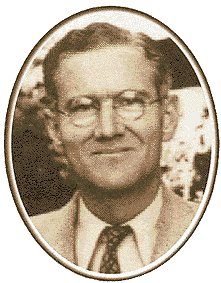
You may have heard, Hiram (Harry) Bingham IV has been awarded a US postage stamp for 2006 (See: here). If you look around the web, you'll also find plenty of articles and websites that discuss him. Recently I recieved a few emials about him - you may have as well - Most of them look like this:
But this letter may throw a little cold water on the issue (from here )A few months ago, Secretary of State Colin Powell gave a posthumous award for "constructive dissent" to Hiram (or Harry) Bingham, IV.
For over fifty years, the State Department resisted any attempt to honor Bingham. For them he was an insubordinate member of the US diplomatic service, a dangerous maverick who was eventually demoted. Now, after his death, he has been officially recognized as a hero.
Bingham came from an illustrious family. His father was the archeologist who unearthed the Inca City of Machu Picchu , Peru , in 1911. Harry entered the US diplomatic service and, in 1939, was posted to Marseilles, France, as American Vice-Consul. The USA was then neutral and, not wishing to annoy Marshal Petain's puppet Vichy regime, President Roosevelt's government ordered its representatives in Marseilles not to grant visas to any Jews. Bingham found this policy immoral and, risking his career, did all in his power to undermine it.
In defiance of his bosses in Washington, he granted over 2,500 USA visas to Jewish and other refugees, including the artists Marc Chagall and Max Ernst and the family of the writer Thomas Mann. He also sheltered Jews in his Marseilles home, and obtained forged identity papers to help Jews in their dangerous journeys across Europe . He worked with the French underground to smuggle Jews out of France into Franco's Spain or across the Mediterranean and even contributed to their expenses out of his own pocket. In 1941, Washington lost patience with him. He was sent to Argentina , where later he continued to annoy his superiors by reporting on the movements of Nazi war criminals.
Eventually, he was forced out of the American diplomatic service completely. Bingham died almost penniless in 1988. Little was known of his extraordinary activities until his son found some letters in his belongings after his death. He has now been honored by many groups and organizations including the United Nations and the State of Israel .
We have been made aware of a communication (dated March 7, 2005) transmitted by Yad Vashem to the Bingham family that we believe to be (and to represent) the final outcome of this complex case. That communication that is presented in full at the bottom of this page, represents, in our considerate view, a fair and balanced assessment of Harry Bingham's deeds during the darkest hours of the 20th Century History.
In a nutshell, Yad Vashem, after considering this matter for some seven (7) years, rejected the Petition for awarding Hiram Bingham IV with the "Righteous Among the Nations" title. Yad Vashem's judgment is in fact identical to the one encapsulated so eloquently by the American National Hero of the Holocaust, Varian Fry --the only American, to date, to be awarded with the "Righteous" title.
The reason for Yad Vashem's rejection of the Righteous title for Bingham IV can be explained in simple terms as follows: Bingham IV during his consular activity in Marseille by not opposing and in fact fully cooperating with Varian Fry's operation made Bingham IV a clear sympathizer and a facilitator, but not a rescuer! And that paramount distinction is at the crux of understanding this entire decision rendered by Yad Vashem.
Robert Kim Bingham often compared his dad to Oskar Schindler. (See, for instance, Mr. Bingham article of May 24, 1998, published in The Day newspaper of New London, Connecticut, USA, entitled Remembering Salem's "Schindler" (Exhibit 04_Schindler, hereto). For sure the two men, Schindler and Bingham IV, had one thing in common: they were both womanizers. But Schindler, unlike Bingham IV, was a rescuer of Jews and that is way Schindler was awarded with the "Righteous Among the Nations" title and Bingham IV was not.
In our herein concurring study to Vad Yashem's rendered opinion, we stated all along, that the late Hiram "Harry" Bingham IV was a good man during evil times and may his goodness be an inspiration and an example for others to follow in trying times. But his goodness and sympathy for Varian Fry's crusade can never ever be translated into a hero of the Holocaust which Bingham IV clearly was not.
May he rest in peace.K. K. Brattman
Managing EditorHere is the letter from Yad Vashem:
The Holocaust Martyrs' and Heroes' Remembrance Authority
Jerusalem, 7 March, 2005
Dear Mrs. Bingham-Endicott,
The Commission for the Designation of the Righteous, after examining all the elements in this interesting case, wishes to express its appreciation for the behavior of your late father, Hiram Bingham IV, in facilitating the emigration of Jewish persons from France, during 1940-41, when your father served in the U.S. consulate in Marseilles.The Commission was impressed by your father's positive and friendly disposition to all who approached him for obtaining visas to the USA, and especially to Mr. Varian Fry, and for his efforts to obtain these visas through diplomatic channels. This included facilitating the exit of Mr. Lion Feuchtwanger and his wife from France, after a visa was received for them through the intervention of Mrs. Eleanor Roosevelt, wife of the President.
Yad Vashem wishes to express its thanks for the humanitarian disposition of your father at a time of persecution of Jews by the Vichy regime in France. Hiram Bingham's assistance in this regard stands out by contrast to certain other officials who rather acted suspiciously toward Jewish refugees wishing to enter the United States. Please be assured that your father's positive behavior, which has been richly documented, will remain inscribed in our archives for the benefit of future generations.
With best wishes to you and to the other members of the Bingham family.Sincerely yours,
s/ ...Yad Vashem
File #10404P.O.B. 3477, JERUSALEM
91034TEL. 02-6443400 FAX. 02-6443443
02-6443443
www.yadvashem.org
***
Editor's Note: Abigail Bingham Endicott, daughter of the late Hiram Bingham IV, acknowledged to us (in her April 5, 2005, email) receiving from Yad Vashem the above posted determination letter and, thanked us for the kind words that we have placed herein.***
This quote probably best sums it up:
"He [Bingham] has a heart of gold. He does everything he can to help us, within American law."
- Varian Fry
Bryna Bercovitch, A Life.
I was cleaning up last night and came accross an article that I read long ago about The life of Bryna Bercovitch.
So, I wondered if any of you readers would be interested...
Wednesday, June 21, 2006
The Neo-Tzig’s ramble: We love you!
A good friend of mine always says that “opposites are the same;” so too here, I’d say that CT & MB are just flip sides of the same coin. We love Tzemach. And although there may be friction from time to time, Hirshel would help Reb Atlas -– he’d give him the shirt off his back -- in a second. It is understandable that Hirshel, and other Lubavitchers, may get upset -- even outraged – at some incendiary comments, inferences or innuendos that are made over at mentalblog.com, just as any Jew would feel if he saw anti-Semitic attacks on Jews or personal attacks directed at a loved one.
I would hope that my family would not stress the negatives of my life, and I certainly wouldn’t think it terribly productive to sit with my wife and discuss the various low-lights of our relationship. Similarly, there is no real need to dwell on some of the unfortunate realities that may exist, and it is not too productive for any family, kehilla, or movement, to hang out every possible shemtz of dirty laundry.
Is a Maamar Chassidus less valid if R’ Moshe or R’ Yisroel Arye Leib didn’t live the life we would have hoped? Should we forever trumpet their failings? Sure, in some circles they would forever be espousing hatred for these people. Some would call them “Sheigetz, Goy, Yemach-Shemonik.” One groups may even refer to their own Rebbe’s father as the “Amolige Rebbe yemach shemo,” but, is that what you’d want if you were R’ Moshe or Leibel?
So, were all about love. I don’t think that there is a valid case to be made of this great vast Lubavitch conspiracy to cover up the horrible truth. If so, then let’s wipe everyone out! It’s time for SCORCHED EARTH! We can pull out the negatives of every man, group, movement, government, religion, you name it. We can emphasize the negative all day long! It won’t make anything about the world better. Or, we can stress the positive, and maybe get somewhere.
We even love the guys that have nothing better to do than try to post really pathetic and hateful comments (often so full of nivel peh that I blush; and I thought “Tony Montana” was bad…) even while they know that the Tent employs comment moderation. I have noticed in the past that Hirshel gets bullied into allowing really stupid comments, but not on my watch. For a comment to get published I humbly request that you follow these simple rules:
1. Same something of some value
2. Say it like a mentch
L’Chaim Yidden!
London calling!
I will iy"h be out of town for a while, leaving tonight and returning on the 6th of Tamuz.
Comment moderation will remain on, as you people cannot be trusted, especially when I'm gone. Release of comments will be sporadic, as I'll be limited in internet access, so please be patient.
(I have left a capable young man to man the ship, and assist in the housekeeping, during my absence. Ecourage him to post something interesting...)
Tuesday, June 20, 2006
באיאן - ליובאוויטש

Not that it matters any, but I've always admired the Boyaner Rebbe for his shunning of most Rebbishe "shtick", for lack of a better term. I remember him as a younger man, already as Rebbe for a long time, coming to Shul in Flatbush and davening with all the others like a regular guy. He would come to NY to visit and spend time with his parents and he would come ALONE. WITH NOBODY ELSE. If you'd see him on the street you'd think "he was one of the guys." In today's day and age, where young Rebbes arrive with "posses" and "entourages" at every Simcha they attend, that's refreshing. There's much more to be said about him, but as far as I'm concerned that's enough.
Last night Reb Nosson Gurary from Buffalo, Zalmen's son, married off a child. His cousin the Boyaner Rebbe came to the Chasunah and was given ברכה אחריתא, a very nice gesture all around. Families sticking together is always nice, especially at Simchas.
This may have been his first visit to CH, although he did send his son to the Rebbe before his Bar Mitzvah. Better late than never.
More photos from COL
Shturem too
Monday, June 19, 2006
Megillas Hitler
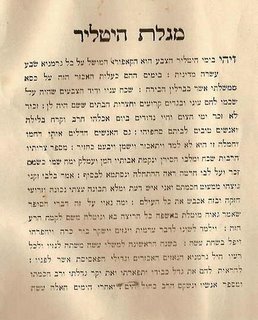
My favorite line:
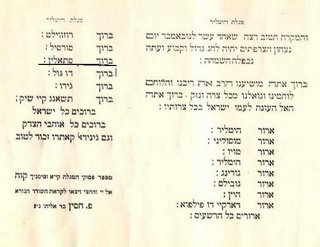
See it here and bid
Thanks to a special friend for the "heads up."
Sunday, June 18, 2006
ספרים חיצונים
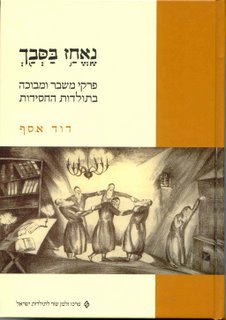
The book the haters are foaming at the mouth about
I find it interesting that Jews who purport to love G-d and his Torah will lie and even resort to books by Maskilim and פושעי ישראל just to prove something that's totally irrelevant. Why is it relevant to the veracity of Chassidus if such and such had a nervous breakdown, or his brother was insane, or his son was a Communist? It isn't, but to a פארשטונקענע מתנגד or a to disenfranchised former member of the clan this will suffice to make his point, his supposed point that Chassidus is a false movement ח"ו and that so were their leaders.
The question here is not what the author had in mind when he wrote it, I don't know him nor his motives, he seems to be excited about Eastern European Chassidim. The question is why all the excitement on behalf of the public? These are some of the same people who burned books when one of their own dared to write that a certain Rosh Yeshiva read novels as a young man! Many of them claim to do out of a "quest to learn the truth", I have my doubts, just as I would have doubts about myself when reading books about my adversaries.
At first my reaction was to ignore it, but when I was told via e-mail that I'm "afraid" to talk about these subjects, and that I should question my Rabbeyim, this thread was born. If the thought of even reading such accusations frightens you then don't click on the link to the book.
I find it ironic that the book is published by the Shazar center......
Auschwitz Yohrtzeit

22 Sivan is the Yohrtzeit of my Paternal Zeide and Bubbe's town, Sajoszentpeter, a suburb of Miskolc.
On that day most of the town was gassed after a long trip to Auschwitz.
My Bubbe, who's parents died long before the war, would fast on that day, until her last year, ועד בכלל, for her sisters who were killed, hy"d.
My Bubbe and Zeide were reunited after the war, a very rare occurence, and were the Unterfirer for most couples who married after the war. My Zeide was taken to forced labor by the Hungarians years before the deportations and ended up as far as Vitebsk. I guess I do have some Russian connection after all....
My Bubbe was told of her husband's survival by an Hungarian Jewish soldier at the Tziyun of Reb LY Barditchever zy"a. at which time my Bubbe headed home.
Some of the more famous Rabbonim of Szentpeter were:
הגאון הרב יצחק גליק , מח"ס חינוך בית יצחק
הגאון הרב חיים סופר, מח"ס מחנה חיים
Saturday, June 17, 2006
........מ'זאל ניט וויסען
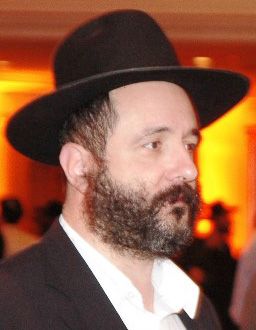
End of Shivah and Asifah for R' Yosef Yitzchok Eidelman ע"ה
אחרי מיטתו של רי"י איידלמאן ע"ה
Fund for the family administered by the Vaad HoRabbonim
Donate to Keren Eidelman
The Eidelmans, Matusovs, Raskins, Pinsons, Lipskers and so on have always had a special place in my heart, although I never had a direct connection with them. Yidden who lived במסירות נפש in Russia for their whole childhood, who agreed at the request of the Rebbe to continue that "lifestyle" instead of making good in America, deserve that respect. To see a Yid who lives במסירות נפש for close to 50 years, suffer so much as to need to sit שבעה for his child is nothing short of heartbreaking.
Reb Yosef Yitzchok was a special Yid in his own right, a Talmid Chochom and ידען אין חסידות, his passing came as a shock to all of Chabad.
תנצב"ה
Friday, June 16, 2006
Rebbes, Rabbonim & Maggiddim

Written for CIRCUS TENT by Mikushor
in response to Whatever happened to Yiddishkeit?
I found a letter in אגרות קודש אדה"ז אדמו"ר האמצעי אדמו"ר הצ"צ, Vol# 1 -- צמח צדק letter # 9, Page# 335). It is dated circa 5603-1743, apparently as a response to questions by the Russian government. Very quickly, this was the thrust of the letter:
Jewish communities need multiple places of worship due to variant versions of נוסח התפלה & מנהגים, and each shul is essentially a different community. Then the letter discusses the need for Jewish communities to have two rabbinical roles to fill:
1) Rav / Moreh Tzeddek to answer questions of איסור והיתר and specifics of הלכה & מצוות.
2) A Maggid to preach words of מוסר, etc.
The reason for this: People may know the Halochoh, but because of their Yetzer HaRah, etc, they need to be strengthened and awakened by someone. Also, there are מצוות התלויות בלב(אהבת ויראת השם, ethical behavior, righteousness, recognition of הקב"ה, etc.) that require a Maggid to teach, inspire, encourage, etc, to elevate his community.
It is also for this reason that Chazal established the סדר התפלה, where we praise and speak of Hashem’s greatness (and to bring one to love & fear Him). But since many people don’t understand לשון הקודש, or they don’t pay attention to the words, we need Maggidim to bring this home to people.
Now, there are different schools of thought as to how this should be done, even though all Jews have the same Torah, both from a practical standpoint (נוגע למעשה) as well as from an internal standpoint (חובות הלבבות):
The approach of the Non-Chassidim is that every community needs a Rov and a Maggid, even sometimes 2 or 3 maggidim. Chassidim have a Rov in a town, but only one Maggid for an entire region. Both approaches are legitimate – having one Maggid per region creates a hardship (since people have to travel to him, or he must travel to the people in all communities under his jurisdiction), and people cannot possibly hear him steadily.
On the other hand, to succeed, this Maggid must be a paragon of virtue, and there are not many men of such perfection. So, rather than to take people who are not truly virtuous, Chassidim find it far better to find the greatest man around, and even if one cannot hear him constantly it is still far better, and accomplishes more, than listening to a far lesser man on a steady basis.
And this reflects the difference of opinion as to Tadir תדיר ומקודש איזה קדם. Chassidim hold Kodesh Kodom, while Non-Chassidim hold Tadir Kodom. And this is also why Chassidim emphasize matters of the heart (such as prayer) while Non-Chassidim emphasize the practical applications and details of practical mitzvos.
Then the letter goes on to discuss the patriotism of the Rabbeyim, etc, based on the Halochos of דינא דמלכותא דינא, and the Halochoh להתפלל לשלומה של מלכות
Note: This was a summary based on what I read last night, and some notes that I wrote down. Please read the letter for yourselves!
Whatta guy!

Gates to cede Software reins
He's going to take time to devote himself to his foundation!
It must be tough for him, a guy that has no reaon to live by the time he's 40, he's already done it all.
Thursday, June 15, 2006
The Words of Reb Yaakov Lipshitz
In addition to being Pinny's zeide, he had his own claim to fame. He was the long-time secretary and right-hand man of Reb Yitzchok Elchonon z"l, the Kovno Rov. This thread aims to prove that the revisionists, who claim to be following the traditions of Old Lithuania, are in fact rewriting history, and making it look like they want it to. They have reopened wounds that have long healed, and that's an unforgivable crime.
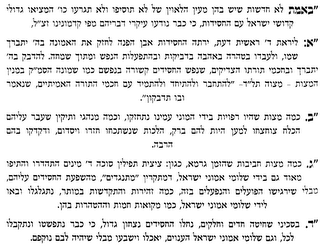
CLICK TO ENLARGE

CLICK TO ENLARGE
From

זאגט א ניגון

Authentic, unadulterated, and a good listen. There's even some Kol Isha in there! ( not linked here) For some reason one of the elderly Peylisher Chassidim, who seemingly had no sons, recorded him and his daughters singing.
Many of the Nigunim were recorded live at Tishen and Farbrengens. The recordings here are short, they're longer on the actual CD.
If you're tired of the so-called "Chasidic music" out there (Hakol Yodeechoo anyone?) give this a listen.
Buy it here, Or Here
LISTEN:
רוז'ינער ניגון
וויזשניצער ריקוד
דביקות חב"ד
יונים נקבצו עלי
ניגון המגיד ממעזריטש נ"ע
ניגון שמחה ליובאוויטש
"ניגון שמחה "פאן-חסידי
כי הנה כחומר
ישמח ישרא-ל בעושיו
(COURTESY OF JEWISHMUSIC.COM)
Wednesday, June 14, 2006
If only Shlomo would know.....
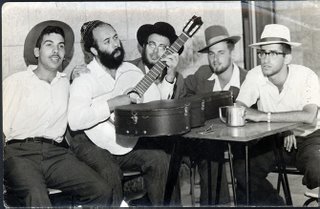
(Shlomo in Yerushalayim in 5718 courtesy of Ben Katz)
Gospel singers sing Carlebach
(The actual video, right there for y'all to click and view, was too inviting, my guilty conscience wouldn't allow me to keep it up there)
Caution: Video contains קול אשה and may include other איסורים
More Carlebach for your viewing pleasure
Tuesday, June 13, 2006
הירשע דוד כץ

(Photo: Vilna Yiddish Institute)
Was it the Yiddish that made look like that? Is it a Russian (Rasputin) thing?
Well, at least we know this much: He's not עובר on לא תקיפו פאת ראשכם and not on ופאת זקנם לא תגלחון, which is more than some of our Yeshivishe friends can say........
All in good fun, relax.
What happened to Yiddishkeit?

(REV, RAK, RMB in Marienbad)
FROM MIKUSHER, ECLUSIVELY FOR CIRCUS TENT
I realize that R’ Moshe Finestein is credited with bringing R’ Aharon to the USA in the hope that he would be able to establish Yehivos that maintain the European high level of learning. But that does not mean that Reb Moshe had no regrets…
Judaism, for a couple thousand years, was Rav-centric. It was the Rabbonim who dealt with people’s problems – be they Halachic, political or even for advice. What was the role of the Roshei Hayeshivos? For the most part, they studied and taught Torah. That’s not to say that (especially in the Lita) they weren’t vaunted and highly respected by the masses, nor is it to say that they never stepped into personal or political matters, but it was clearly not their area.
No longer is this the case. Anyone paying attention cannot miss the fact that the signers of proclamations are full of Roshei Yeshiva; the same is true when it comes to political/halachic opinions – historically purely rabbinic territory. Just look at the people “appointed” by the establishment for Godol: Rav Shach, Rav Shteinman, the Novominsker… they’re not from the rabbinic ranks – they’re Roshei Yeshiva. Where does this come from? This is the fulfillment of R’ Aharon’s dream.
R’ Moshe didn’t appreciate it – and he in fact was very critical of it. He is said to generally refer to R’ Aharon by his last name only, and had no problem telling R’ Aharon to take a seat at an Asifa when he decided R’ Aharon had said enough. Even though the Aguda/Artscroll white-wash wants us to believe that R’ Moshe & R’ Aharon were close friends and we now carry on their tradition, it was quite clear to the two of them that they were polar opposites, and true ideological enemies. Chassidim were of much less importance, since there was a separation between them anyway, but R’ Aharon & R’ Moshe were swimming in the same general pool.
Much to R’ Moshe’s frustration, R’ Aharon was the victor; in fact, it seems that R’ Ahron has been the winner in most of his battles:
1. He was pretty successful in defeating R’ Moshe and the Rabbonim, redefining the structure of 2000 years of Judaism.
2. He successfully created the (seeming unsustainable) Kolel community and ideal.
3. He successfully won over the Chassidic communities to the yeshiva system, and Litvishe values.
4. He (with help) successfully fathered the movement to re-energize the Misnagdic-Chassidic battle, even ultimately turning the tide somewhat in favor of those who oppose Chassidim.
There were definitely things that helped him: The future rabbonim come through the (his) Yeshiva system… He studied under famous Gedolei Lita and was R’ Isser Zalman’s son-in-law, something even R’ Moshe couldn’t claim… There was no other Reb Moshe to carry the Rabbinic torch… Chassidism has faded with the lack of great leaders… the PR machine is behind him…
But, as a Lubavitcher Chossid I know always tells me: ‘It’s all Hashgocha Protis, man.”
Monday, June 12, 2006
Sunday, June 11, 2006
MIA or just not interested?
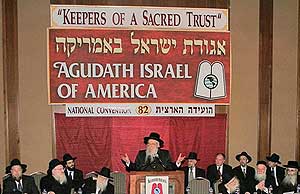
בהמשך to the Agudah post I asked a Lubavitcher קנאי why the Agudah is always in his crosshairs, yet Satmar, a seemingly more inviting target, is hardly ever mentioned?
His answer? The riots of '91.
I was away in Yeshivah camp and was unaware of what was going on in Crown Heights at the time, but he was there, with a house full of young kids right in middle of the action.
"Satmar came to help". While everybody else was nowhere to be found, Satmar came to Crown Heights and offered assistance, Moshe Sherer was in the Catskills doing laps in the pool.
Reasons they did not offer help may include but are not limited to:
1) this was not in their job description either, they only offer assistance to Chadorim, Yeshivos, and Bais Yaakovs.
2) They were busy planning the exciting upcoming convention.
3) Yarchei Kalloh in Lakewood was happening that week.
What our friend doesn't know is that Chachomim like Rabbi Lazer Ginsberg of the Mirrer Yeshiva and Agudah had the answers, supplied directly by the Heavenly Court, as to why the riots were happening. "They think that Moshiach is here already, so G-d showed them that they're still in Golus."
נו, וואס דארף מען ריידען בגנותן של ישרא-ל
Friday, June 9, 2006
Agudah to blame?

Bialistoker commenting on Well? Are You?
The Rashab of Lubavitch and Reb Chaim Brisker were for some reason (from) the only Russian Torah leaders that withstood the temptration to support the Agudah.
You may ask, "why call something that all Gedolei Yisroel supported a temptation?"
The answer is simple. It was a temptation because it seemed like a quick fix to what was ailing Judaism at the time, and it really wasn't. The problems facing world Jewry were far greater than any cute group could fix. What was needed was not just girls schools, which did do something for very few Jewish girls, but something to make Bochurim that were tempted to join a slew of other movements be proud of being Frum Jews.
Instead, all those who did leave the fold were treated "by the book". If he was a Kofer, or Mechalel Shabbos he was ostracized and ignored. Imagine if a little love was shown to these people!
A shame that we did not merit to see that. The Holocaust "took care" of that problem.
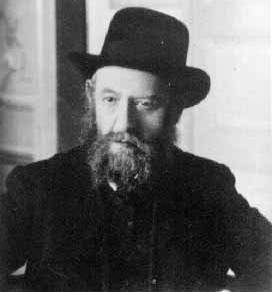
HT responds:
Bialistoker
You started off well, but went on a tangent. What was the connection between the Agudah and Jews leaving the fold? What could they have done differently?
Thursday, June 8, 2006
Wednesday, June 7, 2006
"Itzhak Frey & Son"
A heartwarming "interview" with an elderly אויבערלענדישע איד אין מאה שערים
Includes nice footage of present-day Meah Sheorim
Dovid Frey introduces the documentarian to his elderly father, "the oldest cashier in the Middle East". R' Yitzchok Frey was the son HaRav Meir Yehuda Frei, Rov of Surany (שוראן), Hungary. He passed away on 6 Shvat of this year. He tells the interviewer his opinion about everything from President Roosevelt to the current lack of world knowledge on the part of young people, and was not afraid to tell the interviewer his opinion about the people of his native Switzerland.
He reminds me of my Zeide.
Available for viewing in Russian, Hungarian and German as well.
Remembering Gershon Jacobson
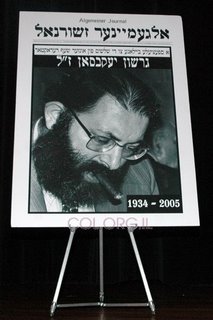
On his First Yohrtzeit.
If you ask me it's (more than) a little overdone, but that's Jakey for you, always making a splash.

(Yossi and Rabbi Besser ZGZ)
Rabbi Lau in English is always a treat
Photos by COL.
Tuesday, June 6, 2006
What to tell the Children
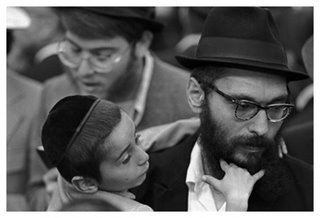
(Photo by Jerry Dantzic)
Guest Post From Chabakuk Elisha:
Ahhhh, yes… אקדמות. Maybe, Hirshel, you can help me out with this one:
My children came home from ישיבה, as do many, many, children before שבועות and repeated the well-known “story behind Akdamos.” I’m sure you’ve heard it before – the witchcraft performing priest, the Rabbonim in Medieval Germany who had the dream, R’ Meir’s journey beyond the mysterious Sambatyon river, the old man, R’ Dan, from Shevet Dan, the face-off between the sorcerer-priest and the miracle working mystic with super powers from places unknown, a flying pillar, fire & millstones… etc.
Well, I don’t know about anyone else, but I don’t know what to make of it. Are we really supposed to believe that this story took place as it is written? I don’t have a problem with a less dramatized version of the story possibly taking place, and I can live with a visitor from beyond Sambatyon - although I don’t believe there is a literal physical rock-spewing-river trapping the ten tribes in some kind of time capsule – but this story is especially hard to believe. Honestly, I always understood the description of Sambatyon as a metaphor (one that I can only speculate as to the meaning of), but that’s just me.
My question is, what about my kids? My oldest son immediately checks with me, “Tatty, it’s true, right? Do you believe it? Should we believe it?”
Now I’m stuck. “No, I don’t believe it took place that way; I believe it might be a parable, a metaphor.” My kids give me a look, they want to believe it. So, what should I do? Am I doing a disservice by, perhaps, weakening their emunah? Am I doing them a service by promoting honesty? Am I undermining their education as frumme yidden? I can go back-n-forth with the pros and cons here, so I figure that I can’t lose much by putting the question “out there” and seeing what comes up…
Well?
Breslov-Bashing
Trying to portray all חוזרים בתשובה as total loonies. Some people make their job quite easy.
Monday, June 5, 2006
More on (no) אקדמות
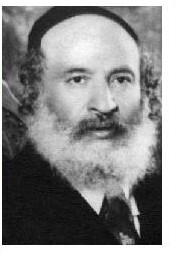
Reb Shaul Yedidya Elazer of Modzitz
As a former Hungarian-Peylisher-Telzer I like to see וואס עס טוט זיך ביי אנדערע so when I saw the שטורעם that other circles make of אקדמות I decided to investigate.
Here's what Heichel Hanegina quotes from Modzitz
I've seen where they say in the name of Reb YD of Belz that his Chassidim should have "Mesiras Nefesh" to recite it with a Minyan.
In other places the אקדמות is the highlight of the Yom Tov.
We all know the וויכוח between the AR and RLY of Barditchev about the recitation of ושמרו on Friday night. The Barditchever said that it's a יריד ביי וועלכע עס קומט די גאנצע פמלי' של מעלה, to which the Alter Rebbe replied אז נישט צו יעדען יריד דארף מען גיין , meaning that it's טאקע געוואלדיג, yet we do not attend. ונימוקו עמו, which in that case would (maybe) mean since the ושמרו is a הפסק, so the הלכה takes precedence.
The old Minhag of starting the first Posuk and then saying Akdomus, which the AR brings as the מנהג הראשונים, has since been changed by all קהלות, hence there is no problem with being מפסיק in middle of קריאת התורה. Still, the Minhog in Lubavitch was not to say it. I have yet to hear a reason why.
Saturday, June 3, 2006
Promotional Items!
SEO Works has the experience and expertise to deliver remarkable increases in website traffic through natural SEO or search Engine Optimisation for businesses specialising in promotional products…
Company Profile: Prime Promotional Products
Product range: promotional products
Established in 1990 to provide small, medium and large corporations with the widest range of superior promotional products, Prime Promotional Products locates, imports, personalises and promotional products from throughout the world for their clients Australia-wide.
Their aim is to supply the latest promotional products from around the globe and the team at Prime Promo regularly attends trade shows in Europe, the Americas and Asia.
Whilst Prime Promo has an extensive range of promotional products to supply to their clients, they particularly concentrate on:
- Custom mousepads and corporate logo mousemats
- Promotional USB drives and logo flash USB sticks
- Promotional pens
- Fridge magnets and custom logo magnets
With a team of over 20, and a loyal client base developed over the last 20 years, you can be assured that Prime Promo has the best level of commitment to customer service, an ideal price range and a history of delivering on time and on budget.
Link to siteThursday, June 1, 2006
!א פרייליכען יום טוב אלעמען

As far as staying up tonight and deciding what to do, be it saying Tikkun or learning, I'll say this. For some reason the Yeshivisher World has made the recitation of Tikkun, a practice kept by the גר"א himself, into something to be scorned. It goes as far as Bochurim learning in certain so-called Chassidishe BP Yeshivos, who would normally say Tikkun are now "forced" to sit by a Gemorah. Is that a problem? absolutely not, but I'd bet good money that not much learning can be done at 2:30 am. Believe me, saying Tikun is hard enough, learning is almost impossible, especially after a heavy meal. But, that's just me.
Can there be Shavuos without אקדמות, רות and flowers in Shul?
Last year in our shul 2 elderly Chassidishe Yidden, one of whom has since left for "greener pastures", one Hungarian and one Galician, davened with us on the 1st day Yom Tov. They almost fell off their chairs when they realized there would be no Akdomus recited here today, but the Torah was given nevertheless, and we all had a good Yom Tov.
The Rebbe would say אקדמות at פתיחת הארון, but that was in deference to his father who would say it.
Don't forget the 'חציו לה
Recommended reading

Rabbi Shlomo Goren, Torah Sage and General
[The story of a young Gerrer Chosid from Zambrow, Poland who excelled in learning in Chevroner Yeshiva under Reb Meyshe Mordche Epstein, and served with the Posek HaDor, Rav Elyashiv in the Israeli Rabbanut]
by Shalom Freedman
Hardcover, 223 pages
27 b/w photographs
ISBN 965-7108-81-0
Series: Modern Jewish Lives - volume 1
publication: 2006
"This book should be on every Jewish bookshelf. Note that I write that without having any financial stake in the book. Buy it. Read it. Have your children read it."
-Gil Student
Hirhurim Blog
I'm not saying that you buy it on account of Gil Student telling you to, I say buy it for the story, the telling pictures, and to see how the mindset of Jews has changed over the years, which is basically what he says.








